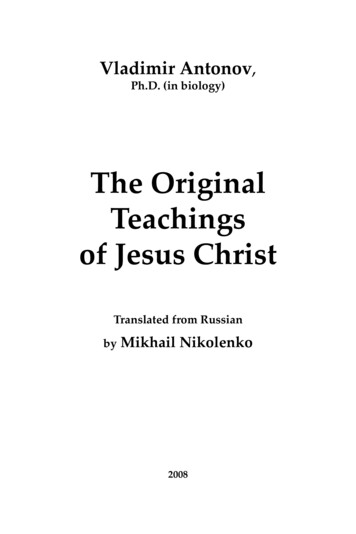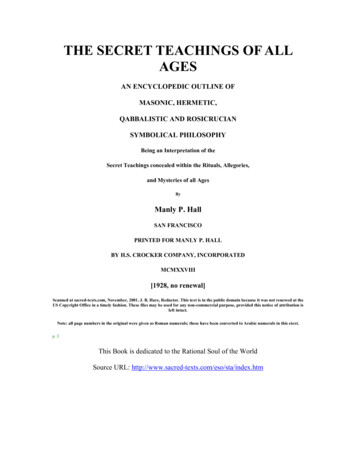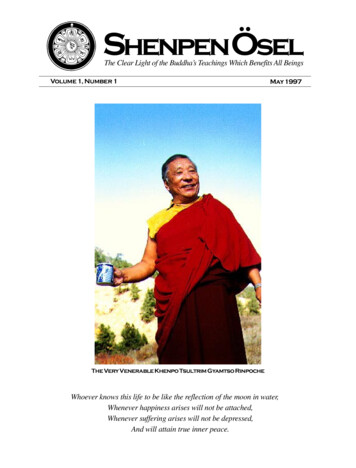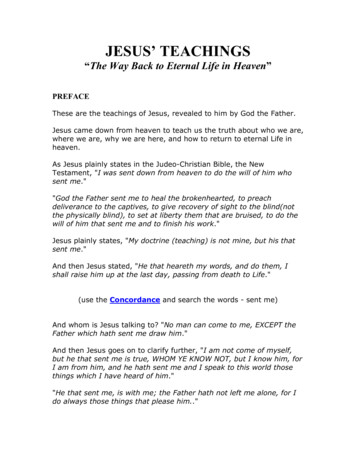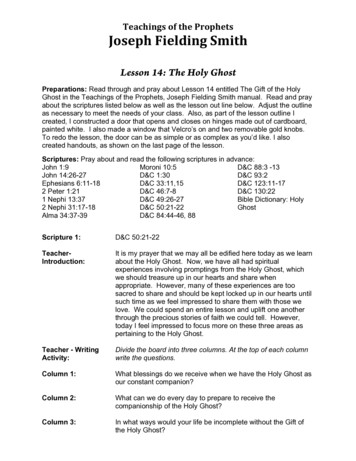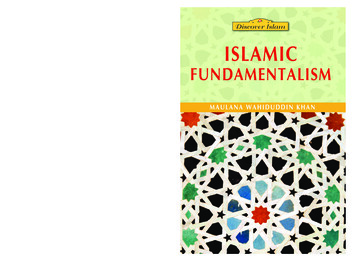
Transcription
CYAN MAGENTA YELLOW BLACKIn this series, Maulana Wahiduddin Khanpresents the fundamental teachings ofIslam in a simple way. The series providesthe general reader with an accurate andcomprehensive picture of Islam—the truereligion of submission to s.cominfo@cpsglobal.orgwww.cpsglobal.orgCYAN MAGENTA YELLOW BLACK
OIn the name of AllahThe Merciful, the Compassionate
First Published 2001Reprinted 2012This book does not carry a copyright.The text in this book is gleaned fromIslam Rediscovered by Maulana Wahiduddin KhanFor more information, please write to:Goodword Books1, Nizamuddin West MarketNew Delhi-110013email: info@goodwordbooks.comwww.goodwordbooks.comPrinted in India
IIslamic Fundamentalismslamic fundamentalism is a recent phenomenon.While studying it we must first of all understandthat the term ‘Islamic fundamentalism’ has notbeen derived from the Islamic scriptures, nor doesany group of Muslims approve of being given theappellation of ‘Islamic fundamentalists.’ This term issomewhat similar to that of ‘Uncle Sam’ as appliedto Americans by non-Americans. Americans do notidentify themselves with this term.Though non-Muslims gave this term to Muslims,the phenomenon for which the term Islamicfundamentalism is used is indeed a reality. There isa considerable number of Muslims in the world oftoday whose thinking and actions add up to what ismeant by the term fundamentalism.That is why a detailed study of its principles andpractices must be made in order to evaluate this wayof thinking and the movements spawned by it, whichare highly active all over the world under one nameor the other.Let us first of all find out what is commonly meantby fundamentalism. I would personally prefer to call3
this phenomenon ‘Islamic extremism,’ rather than‘Islamic fundamentalism,’ although those engaged inextremist activities would, like the fundamentalists,prefer not to be called extremists. However, what isimportant in this connection is that the phenomenonof Islamic extremism can be explained from a Quranicverse. It says: “Do not transgress the bounds of yourreligion (4:17).” One modern form of transgression,as forbidden in the Quran, is what is now calledIslamic fundamentalism.There are certain Muslims who say: “Yes, weare fundamentalists. And what is wrong withbeing fundamentalists?” They take the word“fundamentalist” in its literal sense of laying emphasison the basic teachings of Islam. Thus, attachingimportance to the basic teachings of Islam is to fulfillthe very demand of Islam. So why should anyonehave any objection on this score?But herein lies a fallacy. That is, if one takesfundamentalism in its literal sense, then it should bethe same basic teachings of Islam as are emphasized inthe Islamic scriptures themselves. This cannot meanthat any individual may declare, through personalinterpretation, some self-styled teachings to be thebasic teachings or the fundamentals of Islam, andthen launch a violent movement aimed at establishingthese so-called Islamic fundamentals. Unfortunatelythis is what these fundamentalists are doing.4
Now what is the basic teachings of Islam? Theprinciple concern of Islam is monotheism. Accordingto an orientalist, “the central focus of Islam is Allah.That is to believe in one God; associating all one’sfeelings of love and fear with Him; and worshippingHim alone. Then adhering strictly to justice in one’sdealings with other human beings, returning goodfor evil, and so on.In Islam, according to a hadith, actions are judgedby their intentions. That is why Islam lays thegreatest of stress on the subjection of human beingsto greater and greater degrees of purification.According to a hadith the Prophet Muhammad eobserved: “Listen, there is a part made of flesh inthe human body. If that is purified and therefore ingood order, the whole body is in good order. Andif rot sets in in this part, the whole body is defiled.Listen, this piece of flesh is the heart.” (Sahih AlBukhari, Hadith No. 52).Through this symbol of the body, the example ofIslamic reform has been expressed. This means thatjust as through the reform of the heart the humanbody is reformed, similarly, if a man’s thinking andhis intentions are virtuous, in respect of his wholeexistence, he will acquire that character of virtuewhich is seen as desirable by Islamic standards.5
What is Fundamentalism?Fundamentalism is the laying of emphasis on strictadherence to the fundamental principles of anyset of beliefs. The term was originally applied to aparticular group of Christian theologians who gainedprominence in the United States in the nineteenthCentury. They published a series of booklets between1909 and 1915 called The Fundamentals: Testimony tothe Truth. In these booklets they defined what theybelieved to be the absolutely fundamental doctrinesof Christianity. The core of these doctrines was theliteral inerrancy of every word of the Bible. Thosewho supported these beliefs during the debate of the1920s came to be called fundamentalists.The term “fundamentalism” began to be appliedto Islamic resurgence by the final quarter of thetwentieth century. However this term was not used forMuslims in exactly the same sense as it was applied toChristians. There is also some difference of opinionon this point among scholars. However, withoutgoing into the details of this, I would like to say thatthe term Islamic fundamentalism is applied to twodifferent kinds of movements. One is like that of theMuslim Brotherhood (Ikhwanul Muslimun), whichrose to bring about a political revolution. The otheris the type, which advocates a return to the pristinefundamentals of the faith, for instance, those defined6
by Ibn Taimiya in the fourteenth century. This latteraim is still the driving force behind the Salafia andWahabiya movements.Now the aim of the first form of the Islamicfundamentalism, that of Ibn Taimya is to put anend to additions and innovations (bid‘a) in religiousmatters and to replace them with the sunnah, theoriginal form of the Islamic Shariah.The aim of the other form of fundamentalism isto put an end to non-Islamic political set-up andreplace that with an Islamic political set-up. Boththe forms of fundamentalism are totally differentfrom one another. The sphere of the struggle againstinnovation (bid’a) is confined only to matters of beliefand worship.Violence does not, of necessity, accompanymovements of this nature. Furthermore, it is aimed atand concerned with the internal reform of Muslims.Thus, in the relevant activities, there is no possibility ofcoming into conflict with non-Muslims. But so far asfundamentalism of the other kind is concerned, it hasbeen directed from the very outset against politicalrulers, and whether the inevitable confrontationshave been with Muslim or non-Muslim rulers, by itsvery nature such a movement has demanded the useof violence.7
This is where the principle of jihad has been distortedand bent to political ends. It must be stressed that theword “jihad” has nowhere been used in the Quran tomean the waging of war. The Quran is imbued withthe spirit of peace and tolerance. Its culture is not thatof war but of mercy.On Islam and JihadAt the very beginning of the Qur’an, the first invocationreads: “In the name of God, the most Merciful, themost Beneficent.” Throughout the Qur’an, this verseis repeated for no less than 114 times. Even one ofGod’s names is As-Salam (Peace). Moreover, theQur’an states that the Prophet Muhammad e wassent to the world as a mercy to mankind (21:107).The word ‘jihad’ has nowhere been used in the Qur’anto mean war in the sense of launching an offensive.It is used rather to mean ‘struggle.’ The action mostconsistently called for in the Qur’an is the exerciseof patience. Yet today, the ‘Muslim Mujahidin’ underunfavourable conditions have equated “God is Great”with “War is Great.”In the light of on-going conflict, we must ask whyso great a contradiction has arisen between theprinciples of Islam and the practices of Muslims.At least one root-cause may be traced to historicalexigency.8
Since time immemorial, military commanders havebeen accorded positions of great eminence in theannals of history. It is a universal phenomenon thatthe hero is idolized even in peacetime and becomes amodel for the people. It is this placing of heroism inthe militaristic context which has been the greatestunderlying factor in the undue stress laid on war inthe latter phase of Islam’s history. With the automaticaccord in Muslim society of a place of honour andimportance to the heroes of the battlefield, annalists’subsequent compilations of Islamic history havetended to read like an uninterrupted series of warsand conquests.These early chronicles having set the example,subsequent writings on Islamic history have followedthe same pattern of emphasis on militarism. TheProphet’s biographies were called ‘maghazi’, that is‘The Battles Fought by the Prophet,’ yet the ProphetMuhammad e in fact did battle only three timesin his entire life, and the period of his involvementin these battles did not total more than one and ahalf days. He fought, let it be said, in self-defense,when hemmed in by aggressors, where he simplyhad no option. But historians—flying in the faceof fact—have converted his whole life into one ofconfrontation and war.9
We must keep it in mind that the ProphetMuhammad e was born at a time when anatmosphere of militancy prevailed in the Arabsociety. But the Prophet always opted for avoidanceof conflict. For instance, in the campaign of Ahzab,the Prophet advised his Companions to dig a trenchbetween them and the enemies, thus preventing ahead-on clash.Another well-known instance of the Prophet’s dislikefor hostilities is the Hudaibiyyah peace treaty madeby accepting unilaterally, all the conditions of theenemy. In the case of the conquest of Makkah, heavoided a battle altogether by making a rapid entryinto the city with ten thousand Muslims—a numberlarge enough to awe his enemies into submission.In this way, on all occasions, the Prophet endeavouredto achieve his objectives by peaceful rather than bywar-like means. It is, therefore, unconscionable thatin later biographical writing, all the events of his lifehave been arranged under the heading of ‘battles’(ghazawat). How he managed to avert the cataclysmsof war has not been dealt with in any of the works,which purportedly depict his life.Ibn Khaldun, the celebrated 14th century historian,was the first to lay down definite rules for the studyand writing of history and sociology. He followed10
the revolutionary course of attempting to presenthistory as a chronicle of events centering on thecommon man rather than on kings, their generalsand the battles they fought. But since war heroeswere already entrenched as the idols of society, thecaravan of writers and historians continued to followthe same well-worn path as had been trodden priorto Ibn Khaldun. When people have come to regardwar heroes as the greatest of men, it is but natural thatit is the events of the battlefield, which will be giventhe greatest prominence in works of history. All otherevents will either be relegated to the background oromitted altogether.Ideological HatredHatred is a crime and ideological hatred is the greatestcrime. The so-called Islamic fundamentalism, ifjudged by its result, is the greatest crime of this kindagainst humanity. Any thing can be eliminated, butwhat is impossible to eliminate is the hatred producedby a sacred ideology: Hatred generates violence andideological hatred generates unlimited violence. It cankill all of humanity without suffering any feelings ofremorse or repentance. Hence the self-styled Islamicfundamentalism turns into an un-Islamic theory.One type of movement is that which is based onlove. Its aim is to reform human beings. Such a11
movement awakens in its adherents, feelings of wellwishing towards other human beings. Its exponentsstrive peacefully to pass on the truth that they havediscovered for the benefit of their fellow men. Such amovement, far from causing harm to society, becomesa driving force towards the moral and social uplift ofpeople in all walks of life.The other type of movement is one, which is basedon hatred. The adherents of this movement considerthose who are not like-minded to be enemies. Theyhave an overriding desire to wipe them off the faceof the earth. They hold that these ‘‘enemies’’ areobstacles to their success and that it is thereforenecessary to destroy them altogether. Only then cana system of their own choice be set in place. Islamicfundamentalism—so-called— is a movement of thissecond type. As a result of this negative thinkingthey divide humanity into two camps, one consistingof their enemies, and the other of their friends. Oncehaving made this division, they allow their aversionfor their ‘‘enemies’’ to grow into virulent hatred. Ifthe incentives for the members of the movementbased on love are well wishing and the goodwill ofthe people, the incentives for the members of themovement based on hatred are ill will and animosity.Owing to this negative attitude, all the activities ofIslamic fundamentalism take a pernicious direction.12
To make matters worse, the hatred felt by the Muslimfundamentalists has become inseparable from theirideology. They hate others who think differently fromthemselves because they hold them to be ideologicallyin error. Experience shows that of all kinds of hatred,that based on an ideology is the most rabid. Personalhatred, on the other hand, arises from temporaryfactors, and seldom takes long to dissipate in theordinary course of events. But there is little chanceof ideological hatred abating. And its target is theobliteration of enemies. Not until this end is achievedwill it ever die down. This is the reason that ideologicalhatred takes no time in assuming the shape of violence.When it is found that peaceful means of persuasionare showing no results, arms are then resorted to, sothat all enemies may be removed from its path.Terrorism in the Name of IslamIn the present time, Muslim fundamentalists areresponsible for actions resulting from hatred andmarked by violence taking place in the name of Islam.The famous poet Iqbal presents a justification of whatthey are engaged in in the following couplet:To every vein of falsehood every Muslim is like asurgical knife. (Shikwa Jawab-e-Shikwah).Conversely, however, we find a different picture inthe Quran: “When it is said to them: ‘Do not commit13
evil in the land,’ they reply: ‘We do nothing but good.’But it is they who are the evil-doers, though they maynot perceive it” (2:11).They hold that the aim of Islam is to establish an idealsociety and an ideal state. But since, by their lights,this task cannot be performed without politicalstrength, they feel justified in fighting against thosewho have captured the seats of power.Violent movements with this aim were launched ona large scale during the second half of the twentiethcentury. Their targets were either the non-Muslimrulers or the secular Muslim rulers. But despite greatlosses in terms of life, wealth and resources, thesemovements failed to produce any positive results.Their having become counter-productive is in itselfa proof that their activities were disapproved of byIslam. This is quite expressly stated in the Quran:“God does not love the transgressors” (2:205).The fact is that the terms ‘ideal state’ and ‘idealsociety’ have a wonderful resonance, but their usein the name of Islam is sheer exploitation of Islam.Verse ninety-nine of the 16th chapter is quite specificabout this. It says: “God enjoins justice, kindness andcharity and forbids indecency, wickedness andoppression.” Even more specifically the Quran saysthat God loves the charitable (2:195). And indeed14
idealism and perfection are highly desirable virtuesin Islam, but the direct target of Islamic idealism isnot society, and not the state, but the individual. Theperennial objective of the Islamic movement is tostrive to make each single individual an ideal humanbeing. Each individual has to be urged to become anexample of the ‘sublime character’ as projected by theProphet Muhammad e, and described in the Quran(68:4). So far as the ideal society or the ideal state isconcerned, it is in no way a direct goal of Islam.Society and the State are not in themselves independententities, each being dependent on the mettle of theindividuals of which they are constituted. Accordingto a tradition, the Prophet observed: “As you will be,so will be your rulers” (Mishkat al-Masabih, 11/1097).If the establishment of an ideal State were the actualtarget of Islam, there should, accordingly, be expressinjunctions to this effect in the Quran and hadith.For instance, there should be verses of this type inthe Quran: “O Muslims, you are enjoined to establishan ideal State.” But there is no such verse andneither is there a single hadith, which could lead tothis conclusion. The references put forward by theupholders of this concept are all inferential in nature,whereas according to Islamic jurisprudence, on theissue of any basic Islamic injunction, inferential15
argument is in no way valid. Such argument is forperipheral matters and not for basics.There is another important point in this connection.Those who uphold the establishment of an ideal Stateto be the goal of Islam ought to learn this lesson fromthe early period of Islam that this aim was neitherachieved in this ideal period nor was it achievable.Those who present the first phase of Islam to bethat of an ideal society or an ideal State have fallenprey to a fallacy. They present the example of idealindividuals, equating them with the ideal society orthe ideal State. The truth of the matter is that both aretotally different from each other.It is undeniable that in every period of Islamichistory, we find large numbers of ideal individuals,and this is true even today. But the ideal State is inno way the goal of Islam and neither has such anState ever existed in the ideal sense of the word. Forinstance, the first and foremost matter in the settingup of a state is the appointment of the head of astate. But there is no prescribed procedure for suchan appointment. The Prophet was succeeded by fourrightly guided Caliphs, but every one of them wasselected by a different process, for the simple reasonthat no prescribed method existed at all. This alsoexplains why no tradition could be established for theappointment of the Caliphs.16
This does not mean, however, that there is somethinglacking in Islam, or in Islamic principles. The truth isthat this very point serves as a proof of Islam being adivine religion, and not of human invention. Islam,according to its own claim, is a religion created byGod, which is completely in consonance with nature.(30:30)The Quran tells us that one proof of its being a bookof God is that there is not the slightest inconsistencyin its teachings (4:82). Another proof of this claim isthat the target of the Islamic mission set forth by it isthe building of ideal individuals and not ideal state.In fact, man has been created in this world for thespecial purpose of being put to the test. Accordingto the Quran, the present world is a trial ground andthe Akhirah (the Hereafter) is the place of reward.As a necessary prerequisite, man has been giventotal freedom of action (33:72). That is to say thathe is entirely at liberty either to submit to God or tobecome a transgressor. (18:29)According to the creation plan of God, freedom,or free will is every man’s birthright, and even if hemisuses this power, it will not be taken away fromhim. It is not part of God’s plan of creation ever toabrogate this free will. And it must be conceded that itis this freedom, which is the ever-recurring stumbling17
block in the establishment of an ideal society or anideal State. For even a handful of men, by misusingtheir freedom, can disturb the whole of society. Thatis why the target set by Islam is exactly in accordancewith nature, that is, the reform of the individual.If, on the contrary, the Muslims had been given themission of establishing an ideal society, or an idealState, that would have been so unnatural as to be quiteimpossible. Islam has, therefore, given Muslims atarget which is practicable and which, in consequence,does not oblige them to come into conflict withnature. The violence, which marks the activities ofMuslim fundamentalist groups, is the result of notkeeping in mind this wisdom of Islam. If you aimat the reform purely of the individual, you will notneed to resort to violence for the achievement of yourgoal. For the task of reforming the individual can becarried on, from beginning to end, in an atmosphereof peaceful persuasion. Whereas the struggle tochange the system of the State, being a subversiveactivity, necessarily leads to war and violence.Well-known examples of peaceful persuasion arethe movements launched by the Sufis, the target ofwhich was not the state, but the individual. Theirtask involved the spiritual reform of people’s heartsand minds, so that they might lead their lives asnew, transformed human beings. Thanks to their18
adherence to this wise policy, the Sufis did not needto resort to violence. Another example in our timesis provided by the Tablighi Jamaat, which has beenworking peaceably on a large scale in the sphere ofindividual reform.Since Islamic fundamentalists target the Islamizationof the State rather than the reform of individuals,their only plan of action is in the very first instanceto launch themselves on a collision course with therulers who hold sway over the institution of theState. In this way, their movement takes the path ofviolence from day one. Then all the other evils creepin which are the direct or indirect result of violence,for instance, mutual hatred and disruption of thepeace, waste of precious resources, and so on.It would be right and proper to say that Islam is aname for peaceful struggle, while the so-calledIslamic fundamentalism is quite the reverse. Fromthe foregoing details it is quite clear that violence, farfrom arising from the teachings of Islam, is a directproduct of Islamic fundamentalism.Fundamental Principles of IslamIf we are to put ‘fundamentalism’ in the correctperspective, we should be clear about what actuallyconstitutes the fundamental principles of Islam.There is a hadith, which gives us clear guidance on19
this subject. The Prophet observed that Islam isfounded on five pillars: Bearing witness that thereis no god but the one God and that Muhammad eis God’s Messenger; the regular saying of prayers(salat); alms-giving (zakat); performing a pilgrimageto the Kabah, the House of God in Makkah (hajj);and fasting for the month of Ramadan (sawm).These then are the fundamental principles, or pillarsof Islam. The rest of the teachings fall into the categoryof detailed explanations of and elaborations uponthe five basic principles. Holding any other preceptbesides these to form part of the basic tenets of Islamis misguided and unacceptable.On further investigation, we find that these fivebasic teachings have a spirit as well as a form and,what is of real significance is that the true essence ofIslam resides not in its outward forms but in its innerspirit. That is why our actions, according to a hadith,must be judged by their intentions alone. (Sahih alBukhari, Hadith No. 1)Let us take the first of the above principles, which isthe article of faith (kalima). The form it takes is theutterance of certain words, expressing one’s faith.But this verbal expression is not in itself sufficient.It is essential that at the same time, the concernedperson should be imbued with the actual spirit of the20
words he utters. As we find in the Qur’an: “The Arabsof the desert declare: ‘We believe,’ ‘You do not.’ Sayrather: ‘We profess Islam,’ for faith has not yet foundits way into your hearts” (49:4). This shows that toGod, the real faith (iman) is that which reaches intothe deepest recesses of the heart; which awakenshuman consciousness in such a way as to bring to theindividual the realization of God. That is to say thatthe concept of form here is relative, while the conceptof spirit is what truly matters.In the case of prayer (salat) too, we know that prayerhas a fixed form and is to be observed at stipulatedtimes. But here too it is not the adherence to form inthe repetition of prayer, or the postures adopted, butthe spirit pervading the performance of these rites,which is of overriding importance. That is why theQuran says: “Successful indeed are the believers whoare humble in their prayers” (23:3). It is essential,therefore, that the ritual of prayer be imbued with theproper spirit.The third pillar of Islam, alms-giving (zakat), that is,the payment of a fixed amount from one’s earningsto others who are in greater need, is again apparentlyan act of pure formality, but according to the Quran,the inner spirit of zakat is fear of God. The Qurandescribes the believers as “those who dispense theircharity with their hearts full of fear .” (23:60)21
As we know, the pilgrimage to Makkah (hajj), thefourth pillar of Islam, is organized along particularlines, according to the rites and rituals of hajj. Butbelievers are made aware at all times that it is notjust mere presence in Makkah and the physicalaccomplishment of the rites which really matter,but the circumspect conduct accompanying eachact, the restrained and disciplined behaviour whichreveals the earnest intentions of the pilgrim to leada righteous life then and throughout the rest of theyear. Again it is the spirit of the thing, which counts.The fifth pillar of Islam, fasting (sawm) for the wholeof the month of Ramadan, is not concerned merelywith abstinence from food and drink during eachday from sunrise to sunset, but with the devotion andgratitude to God which self-denial teaches (2:183).Thus the essence of fasting is to produce the spirit ofpiety. In the words of the hadith, a fast without thisspirit is only the experience of hunger and thirst. Assuch, it is not a true fast in the religious sense of theword (Mishkat al-Masabih).That these are the five fundamentals of Islam hasbeen made quite clear by the Prophet himself.Furthermore, what is desirable in the observanceof all of these five pillars is the internal spirit andnot the external form. Now if certain people take itupon themselves to revive these five fundamentals22
of Islam, their endeavours will be confined to anentirely peaceful sphere of activity. At no stage wouldthey ever reach the point of resorting to violenceand aggression. The inner spirit which is meant topervade all actions stemming from the observanceof these principles can only be inculcated by advice,counseling and well-reasoned argument. There is noother viable way of achieving this objective save thatof peaceful striving.Islam and PoliticsIn making an assessment of Islam in relation topolitics, one crucial point must be taken intoconsideration, which is that, politics is only a relativeand not the real part of Islam. This difference betweena real and a relative feature is that what is essential isrelevant in all circumstances and at all times, whereasthe relative is required only in relation to particularsets of circumstances. Wherever such circumstancesdo not exist, relative features lose their relevanceand therefore their desirability. This differencebetween the real and relative is illustrated by theQuranic injunction to perform the Hajj pilgrimage:“Pilgrimage to the House of God is a duty to God forall who can make the journey” (3:97).The wording of the command to perform Hajj showsthat it is not obligatory for all believers in any absolute23
sense. It is obligatory rather for those who have themeans and the resources, and who are in good enoughhealth to reach the place of pilgrimage. Neither doesthis injunction even imply that those who do nothave the means should make superhuman efforts tofind the wherewithal for the journey, so that they mayperform this ritual worship. This injunction meansthat those who have the means should perform thepilgrimage and those who have not will not only beexempted, but will not even be held to account forhaving failed to do so.The same is true of politics. That is, if a group ofMuslims find themselves in a position to establish thepolitical system of Islam by peaceful methods, andwithout any violence, then the Shariah will requirethem to do exactly that. But for those who do not findthemselves in such a position, it is not their boundenduty to establish an Islamic political system, nor arethey required to set in motion political initiativescalculated to create opportunities to do so.That is why the Quran at no point gives the followingcommand: “O Muslims, establish the political systemof Islam.” On the contrary, the Quran makes suchclear statements about government and politics asprove that they are relative and not the real partsof Islam. For instance, addressing the believers theQuran says:24
God has promised those of you who believeand do good works that He will make themmasters in the land as He had made theirancestors before them, in order to strengthenthe faith He chose for them, and to changetheir state of fear to a sense of security. Letthem worship Me and no other gods besidesMe. Wicked indeed are those who after thisdeny Me. (24:55)From this it is abundantly clear that political poweris a gift from God and is far from being a matter of agoal to be attained by human efforts. That is, it is notthe Islamic way to launch movements with the aimof achieving political ascendancy. On the contrary,the objective of the Islamic struggle is to inculcatein people the Islamic character and the true spiritof Islam. And then, if, in any given society, a largenumber of people were to become imbued wi
We must keep it in mind that the Prophet Muhammad e was born at a time when an atmosphere of militancy prevailed in the Arab society. But the Prophet always opted for avoidance of conflict. For instance, in the campaign of Ahzab, the Prophet advised his Companions to dig a trench between them and the enemies, thus preventing a head-on clash.

